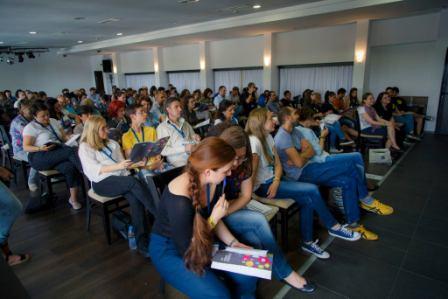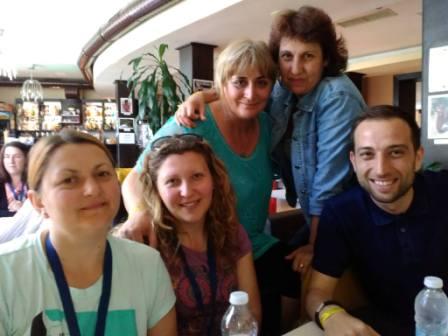26.06.2017What operations does OPSESG plan by the end of 2017?
The sixth meeting of the Monitoring Committee of the Science and Education for Smart Growth OP took place on 23 June in Sofia. Its participants adopted the Annual Program Implementation Report in 2016, as well as updated the Indicative Annual Work Program for 2017, and also looked at Criteria for Selection of Operations.
A total of eight new operations must be announced by the end of the year. Half of them are under Priority Axis 3 "Educational Environment for Active Social Inclusion":
1. "Support for vulnerable groups for access to higher education": this operation will apply - for the first time - the so-called "simplified costs." The operation aims to increase the number and percentage of young people in high schools and secondary schools from vulnerable groups: young people with disabilities, representatives of ethnic minorities and other unrepresented or under-represented groups.
The operation will be implemented as a competitive selection procedure in two components. Component 1 will support minor repairs to make the environment accessible to students with disabilities, with universities applying. Component 2 will support the enrollment and training of students from ethnic minorities and other vulnerable groups in secondary and tertiary schools. This will be done through information and motivation campaigns, candidate student courses, application fees and semester fees, parental engagement and negative stereotyping, volunteer activities in vulnerable groups through which the supported youth will retain their relationship with the communities they originate from. Schools and NGOs will be eligible for projects. Approved projects will be two-year. Component 2 projects will cost between BGN 50,000 and BGN 100,000. This will support 1,000 students with disabilities and 1,200 students from ethnic minorities.
The updated IAWP provides for the call for projects to be launched in October 2017 and the application to be made by December;
2. "Increasing the capacity of pedagogical specialists to work in multicultural environment": the operation will support the practical training of 2000 pedagogical specialists for work in multicultural environment. As opposed to the other qualification operation (Qualification and re-qualification of pedagogical specialists), this one will be implemented as a competitive selection procedure for projects that will be open to universities and NGOs registered under Article 222 of the School Education Act. The Committee accepted the suggestion made by Deyan Kolev, a representative of the NGO group working for the integration of minority groups, about schools and kindergartens to be possible beneficiaries and partners within the operation.
The updated IAWP provides for the call for projects to be launched in October 2017 and the application to be made by December;
3. "Ensuring access to quality education in small settlements and in hard-to-reach areas": it will follow the community-led local development approach, continuing the Leader approach from the previous programming period, ie the funds from the operation will be distributed by the Local Action Groups in whose Strategies educational integration measures are put in place. The funds will be reallocated through competitive selection procedures for projects managed by the respective LAGs. Schools and municipalities in partnership with NGOs registered on the territory of the respective LAG at least a year earlier will be eligible within this call. The projects could include additional activities for teachers to prevent the dropping out of children and students from minorities including new pedagogical specialists and assistant teachers, canteens, transportation, improvement of material and household conditions in schools and kindergartens (including ICT purchases), interaction with parents. Special emphasis will be put on improving access and increasing the motivation of pupils from marginalized groups for inclusion in the vocational education system: through motivation campaigns, improvement of the facilities in the vocational high schools, free transport, student books, etc.
The IAWP provides for an invitation to the LAG to be issued in July. After the approval of project proposals, each LAG will invite schools, gardens and municipalities in their territory according to their timetable;
4. "Integrated measures to improve access to education" is integrated operation with OP "Human Resources Development" (part of OPHRD is called "Socio-economic Integration of Marginalized Communities"). The integrated procedure will be implemented in two components:
Component 1 (BGN 50 million OPHRD + BGN 5 million): On the territory of municipalities with updated municipal plans for Roma integration for the period 2015-2020, in accordance with the National Strategy of the Republic of Bulgaria for Roma Integration 2012-2020. These are the municipalities of the so- called "Rural areas", as well as those urbanized municipalities that do not have the construction of social housing in their Infrastructure development plan. These will be the so-called. "Soft measures", divided into 4 strands: access to employment, education, social and health services, development of local communities and overcoming stereotypes;
Component 2 (BGN 30 million OPHRD + BGN 3 million OPNOIR): On the territory of the municipalities of 39 cities from the 1st to 3rd hierarchical level of the national polycentric system, according to the NSRF 2013-2025 - Beneficiaries under Priority Axis 1 of the OPRD 2014-2020, which IDP includes measures for the construction of social housing. These measures will be implemented as well as the construction / reconstruction of social housing.
In March the design concepts of fifty-two municipalities from Component 1 were approved. They will be invited by the Managing Authorities of OPHRD and OPSESG as concrete beneficiaries to develop integrated project proposals. Each municipality will develop a project that will include OPHRD and OPSESG components - in a given template.
The updated IAWP provides for municipalities to be invited to develop their project proposals in July 2017. For more on the integrated procedure, see here.
Four other operations will be announced under Priority Axis 2 "Education and Lifelong Learning": Quality Assurance System in Vocational Education and Training, Introduction of a Dual Training System - Domino 2, Improvement of National Validation System, Development of the System For Career Guidance for students. All four operations are with a specific beneficiary - MES or NAVET. Only one of the components of Domino 2 will be eligible for vocational high schools.
The sixth meeting of the Monitoring Committee of the Science and Education for Smart Growth OP took place on 23 June in Sofia. Its participants adopted the Annual Program Implementation Report in 2016, as well as updated the Indicative Annual Work Program for 2017, and also looked at Criteria for Selection of Operations.
A total of eight new operations must be announced by the end of the year. Half of them are under Priority Axis 3 "Educational Environment for Active Social Inclusion":
1. "Support for vulnerable groups for access to higher education": this operation will apply - for the first time - the so-called "simplified costs." The operation aims to increase the number and percentage of young people in high schools and secondary schools from vulnerable groups: young people with disabilities, representatives of ethnic minorities and other unrepresented or under-represented groups.
The operation will be implemented as a competitive selection procedure in two components. Component 1 will support minor repairs to make the environment accessible to students with disabilities, with universities applying. Component 2 will support the enrollment and training of students from ethnic minorities and other vulnerable groups in secondary and tertiary schools. This will be done through information and motivation campaigns, candidate student courses, application fees and semester fees, parental engagement and negative stereotyping, volunteer activities in vulnerable groups through which the supported youth will retain their relationship with the communities they originate from. Schools and NGOs will be eligible for projects. Approved projects will be two-year. Component 2 projects will cost between BGN 50,000 and BGN 100,000. This will support 1,000 students with disabilities and 1,200 students from ethnic minorities.
The updated IAWP provides for the call for projects to be launched in October 2017 and the application to be made by December;
2. "Increasing the capacity of pedagogical specialists to work in multicultural environment": the operation will support the practical training of 2000 pedagogical specialists for work in multicultural environment. As opposed to the other qualification operation (Qualification and re-qualification of pedagogical specialists), this one will be implemented as a competitive selection procedure for projects that will be open to universities and NGOs registered under Article 222 of the School Education Act. The Committee accepted the suggestion made by Deyan Kolev, a representative of the NGO group working for the integration of minority groups, about schools and kindergartens to be possible beneficiaries and partners within the operation.
The updated IAWP provides for the call for projects to be launched in October 2017 and the application to be made by December;
3. "Ensuring access to quality education in small settlements and in hard-to-reach areas": it will follow the community-led local development approach, continuing the Leader approach from the previous programming period, ie the funds from the operation will be distributed by the Local Action Groups in whose Strategies educational integration measures are put in place. The funds will be reallocated through competitive selection procedures for projects managed by the respective LAGs. Schools and municipalities in partnership with NGOs registered on the territory of the respective LAG at least a year earlier will be eligible within this call. The projects could include additional activities for teachers to prevent the dropping out of children and students from minorities including new pedagogical specialists and assistant teachers, canteens, transportation, improvement of material and household conditions in schools and kindergartens (including ICT purchases), interaction with parents. Special emphasis will be put on improving access and increasing the motivation of pupils from marginalized groups for inclusion in the vocational education system: through motivation campaigns, improvement of the facilities in the vocational high schools, free transport, student books, etc.
The IAWP provides for an invitation to the LAG to be issued in July. After the approval of project proposals, each LAG will invite schools, gardens and municipalities in their territory according to their timetable;
4. "Integrated measures to improve access to education" is integrated operation with OP "Human Resources Development" (part of OPHRD is called "Socio-economic Integration of Marginalized Communities"). The integrated procedure will be implemented in two components:
Component 1 (BGN 50 million OPHRD + BGN 5 million): On the territory of municipalities with updated municipal plans for Roma integration for the period 2015-2020, in accordance with the National Strategy of the Republic of Bulgaria for Roma Integration 2012-2020. These are the municipalities of the so- called "Rural areas", as well as those urbanized municipalities that do not have the construction of social housing in their Infrastructure development plan. These will be the so-called. "Soft measures", divided into 4 strands: access to employment, education, social and health services, development of local communities and overcoming stereotypes;
Component 2 (BGN 30 million OPHRD + BGN 3 million OPNOIR): On the territory of the municipalities of 39 cities from the 1st to 3rd hierarchical level of the national polycentric system, according to the NSRF 2013-2025 - Beneficiaries under Priority Axis 1 of the OPRD 2014-2020, which IDP includes measures for the construction of social housing. These measures will be implemented as well as the construction / reconstruction of social housing.
In March the design concepts of fifty-two municipalities from Component 1 were approved. They will be invited by the Managing Authorities of OPHRD and OPSESG as concrete beneficiaries to develop integrated project proposals. Each municipality will develop a project that will include OPHRD and OPSESG components - in a given template.
The updated IAWP provides for municipalities to be invited to develop their project proposals in July 2017. For more on the integrated procedure, see here.
Four other operations will be announced under Priority Axis 2 "Education and Lifelong Learning": Quality Assurance System in Vocational Education and Training, Introduction of a Dual Training System - Domino 2, Improvement of National Validation System, Development of the System For Career Guidance for students. All four operations are with a specific beneficiary - MES or NAVET. Only one of the components of Domino 2 will be eligible for vocational high schools.










